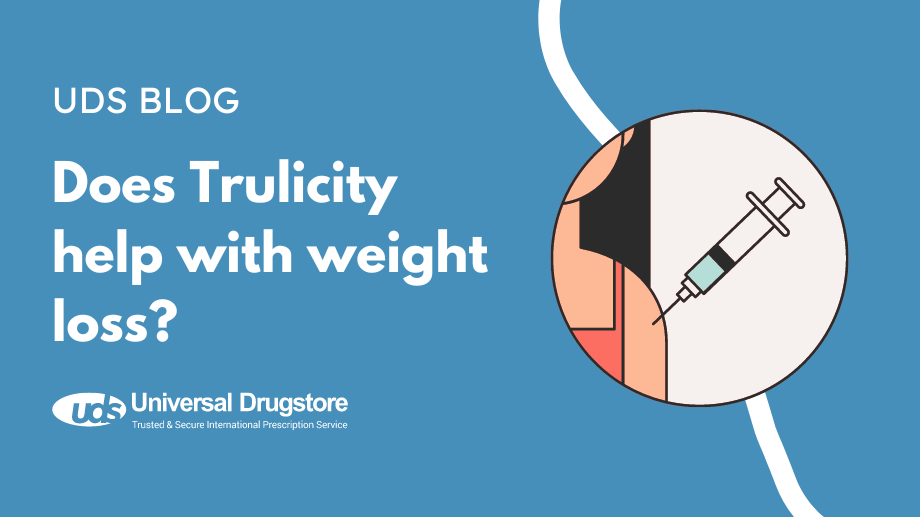Does Trulicity help with weight loss?

Trulicity (dulaglutide) is a prescription injectable given with diet and exercise for type 2 diabetes mellitus (T2DM). It lowers blood sugar and, in people with heart disease,
reduces the risk of cardiovascular events such as heart attack or stroke.Trulicity is a glucagon‑like peptide‑1 (GLP‑1) receptor agonist.
Although not approved by the U.S. Food and Drug Administration (FDA) as a weight‑loss drug, Trulicity may be prescribed off‑label for weight management in people who are overweight or obese.
In clinical trials supporting FDA approval for T2DM, most participants lost weight when
Trulicity was added to metformin:
- 0.75 mg: average loss ≈ 2.7 kg (5.9 lb) after 52 weeks
- 1.5 mg: average loss ≈ 3.1 kg (6.8 lb)
- 3.0 mg: average loss ≈ 3.8 kg (8.4 lb)
- 4.5 mg: average loss ≈ 4.6 kg (10.1 lb)
What is Trulicity used to treat?
Trulicity (dulaglutide), manufactured by Eli Lilly, is FDA‑approved to:
- Control blood glucose, with diet and exercise, in adults and children ≥ 10 years with T2DM
- Reduce the risk of serious cardiovascular events in adults with T2DM and established heart disease or multiple risk factors
Trulicity is not approved for type 1 diabetes, diabetic ketoacidosis, or obesity.
Currently, the only GLP‑1 drugs specifically approved for weight loss are Saxenda
(liraglutide) and Wegovy (semaglutide).
How does Trulicity work?
Dulaglutide activates the GLP‑1 receptor, prompting the pancreas to secrete more insulin and
suppressing glucagon release from the liver. It also slows gastric emptying, helping you eat
less and improving blood‑sugar control. Trulicity is not insulin and can be prescribed
alongside insulin, metformin, or sulfonylureas.
What are the side effects of Trulicity?
The most common side effects reported were:
- Nausea
- Diarrhea
- Vomiting
- Abdominal pain
- Decreased appetite
- Indigestion
- Fatigue
- Upset stomach
- Constipation
- Dry mouth or dehydration
- Lightheadedness
- Injection‑site reactions (rash, redness)
Rare but serious adverse effects include:
- Severe allergic reactions
- Increased risk of medullary thyroid carcinoma (MTC) and MEN 2
- Pancreatitis
- Diabetic retinopathy complications
- Severe hypoglycemia, especially with insulin or sulfonylureas
- Kidney problems
- Gallbladder disease and gallstones
This is not a complete list. Consult your healthcare provider for medical advice and report
adverse events to the FDA at 1‑800‑FDA‑1088 or www.fda.gov/medwatch.
Who should not take Trulicity?
Trulicity should be avoided if you have:
- A personal or family history of MTC or MEN 2
- Severe diabetic retinopathy
- Significant digestive disorders such as gastroparesis
- Gallbladder disease
- Kidney disease or reduced kidney function
- History of pancreatitis
- Allergy to dulaglutide or its ingredients
- Current pregnancy, planned pregnancy, or breastfeeding
- Type 1 diabetes or diabetic ketoacidosis
How much weight can you lose with Trulicity?
In a 9‑month study of > 1,800 patients titrated from 0.75 mg to maintenance doses,
participants on 4.5 mg lost about 10 lb on average, while those on 1.5 mg lost just under 7 lb.
Greater weight loss was observed in patients with higher baseline BMI and higher doses.
Individual results vary.
What drug interactions are there with Trulicity?
Potential interactions include:
- Insulin and other diabetes medicines (e.g., Januvia, metformin, sulfonylureas)
- Oral medications whose absorption may be affected because Trulicity slows digestion
How long does it take Trulicity to work for weight loss?
Response varies, but weight‑related effects often start within 2 weeks. Appetite changes may
be noticeable in the first week.
Which is better for weight loss, Trulicity or Ozempic?
In a study of 1,201 adults on metformin, Ozempic produced greater weight loss at
comparable doses. For example, Ozempic 0.5 mg led to an average loss of 9.3 lb versus 4.6 lb
with Trulicity 0.75 mg; Ozempic 1 mg resulted in 12.8 lb lost versus 6.2 lb with
Trulicity 1.5 mg.
Related Medications
- Wegovy (dulaglutide)
- Ozempic (semaglutide)
- Rybelsus (semaglutide)
- Mounjaro (tirzepatide)
- Saxenda (liraglutide)
- Victoza (liraglutide)
Sources
- Frias JP, Bonora E, Nevarez Ruiz L, et al. Diabetes Care. 2021;44(3):765‑773. Accessed June 25, 2024.
- Ozempic Efficacy and Safety. NovoMedLink. Accessed June 25, 2024.
- Trulicity [package insert]. Eli Lilly and Company. Accessed June 25, 2024.
- Trulicity. Medscape. Accessed June 25, 2024.
- Pratley RE, et al. Lancet Diabetes & Endocrinology. 2018;6(4):275‑286. Accessed June 25, 2024.
